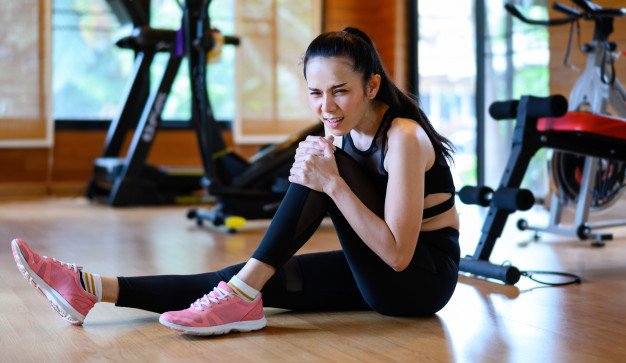70% Of People In The Age Group Of 40-60 Suffer From Knee Pain Due To Hyperactive Behaviour After Unlock Phase

Pune: During Covid-19 lockdown, people were advised to stay home. After lockdown, several restrictions have been eased off. Many people have now started complaining of knee pain as they suddenly have become hyperactive and started over-exercising. People are exercising in the wrong way and that is taking a toll on their knees. The ongoing winter season and colder temperatures have also contributed to aggravating knee pain.
The sedentary lifestyle during lockdown has been the culprit behind the notorious knee pain. People stayed at home and most physical activities came to a standstill. Several people worked from home in awkward and non-ergonomic positions using several electronic gadgets. They were sitting for long hours continuously, either leaning on their tables or sitting crosslegged on the floor. Many people had to do unaccustomed household chores in kneeling, squatting, or sitting positions. This leads to knee pain due to abnormal knee overloading. People also had deficiencies of vitamins, especially vitamin D, due to lack of exposure to adequate sunlight. The sedentary lifestyle also caused weight gain in many people.
In these unprecedented times of covid pandemic, people's lives have been turned upside down. The lockdown took a toll on one’s physical and mental health. But now several people have also started to take their health issues seriously.
“Due to lack of movement during the lockdown, 70% of people in the age group of 40-60 have now become hyperactive after the unlocking phase and are over-exercising. Often incorrectly and in the wrong postures. This causes abnormal loading of the knee cartilage and leads to pain and increased cartilage wear. This is happening with squatting, kneeling, sudden twisting or rolling of knees, prolonged sitting, and repeated use of stairs. 8 out of 10 patients visiting me recently have knee problems of some form. The knee pain can be felt during rest, whilst walking or exercising, and even at night. People may also experience knee swelling along with difficulty in walking" said Dr Anand Jadhav, Joint Replacement & Arthroscopy Specialist, Apollo Spectra Hospital, Pune
Dr Jadhav added, "People with knee pain should opt for healthy lifestyle changes for pain relief. Avoiding provocative activities, taking simple painkillers as needed, doing daily knee exercises, regular brisk walking, lightweight training 2 to 3 times a week, and stretching exercises will go a long way in controlling knee pain. Patients must also watch their diet and try to keep their weight at optimum levels. This reduces excessive loads on the knee joint. Do not squat or kneel when working, and avoid prolonged standing or sitting, avoid long treks and uphill or downhill climbs. But people can trek on flat surfaces. Similarly, they can use a stationary exercise bicycle and use a treadmill at a flat level without any incline. These measures go a long way in preventing knee pain. Any exercise must be done under the supervision or guidance of a physiotherapist or a trained fitness or yoga instructor. Proper warm-ups and cool-downs after exercising are also very important to keep knee injuries at bay.
Healthy eating habits should include a diet consisting of green leafy vegetables, milk, fruits, beetroot, soybeans, and fish. A healthy diet and exercises keep your bones, muscles, and joints strong. Get minimum 20 minutes of sunshine on a daily basis and avoid staying indoors for long hours."
For patients with persistent knee pain, orthopaedic doctors advise knee x-rays and occasionally knee MRI to look for the status of knee cartilage, assess the severity of any wear, and also any associated meniscal tears on MRI scans. The treatment advised depends upon the stage of knee wear, patient's symptoms, and physical findings.
Dr. Jadhav follows a step-ladder approach for the treatment of patients with knee pain. If the knee pain persists even after taking medications, regular knee exercises, and lifestyle changes, then knee joint injections are used in the early stages of wear. For localized and advanced knee arthritis, a partial (unicompartmental) knee replacement surgery gets advised. But if the entire knee has advanced arthritis or such patients are above 70 years of age, then a total knee replacement (TKR) is advised. Joint Replacement is the last option that leads to excellent pain relief, improved mobility, and an active and independent lifestyle. These good results can easily last for 15 to 20 years with modern implants and improved surgical techniques.
Dr. Sanjay Ingle, Pathologist, and Zonal Technical Head West India, Apollo Diagnostics, said, “Rheumatoid arthritis is a chronic inflammatory disease characterized by uncontrolled proliferation of synovial tissue and a wide array of multisystem comorbidities. Prevalence is estimated to be 0.8 percent worldwide, with women twice as likely to develop the disease as men. Untreated, 20 to 30 percent of people with rheumatoid arthritis become permanently work-disabled within two to three years of diagnosis. Genetic and environmental factors play a role in pathogenesis. Although laboratory testing and imaging studies can help confirm the diagnosis and track disease progress, rheumatoid arthritis primarily is a clinical diagnosis and no single laboratory test is diagnostic. Patients from all age groups can acquire the disease, hence the additional categories of juvenile-onset and elderly onset rheumatoid arthritis.”
Dr Ingle added, “Complications of rheumatoid arthritis may begin to develop within months of presentation; therefore, early referral to or consultation with a rheumatologist for initiation of treatment with disease-modifying antirheumatic drugs is recommended. Progression of rheumatoid arthritis is monitored according to American College of Rheumatology criteria based on changes in specific symptoms and laboratory findings. Predictors of poor outcomes in the early stages of rheumatoid arthritis include low functional score early in the disease, lower socioeconomic status, early involvement of many joints, high erythrocyte sedimentation rate or C-reactive protein level at disease onset, positive rheumatoid factor, and early radiologic changes.”















































